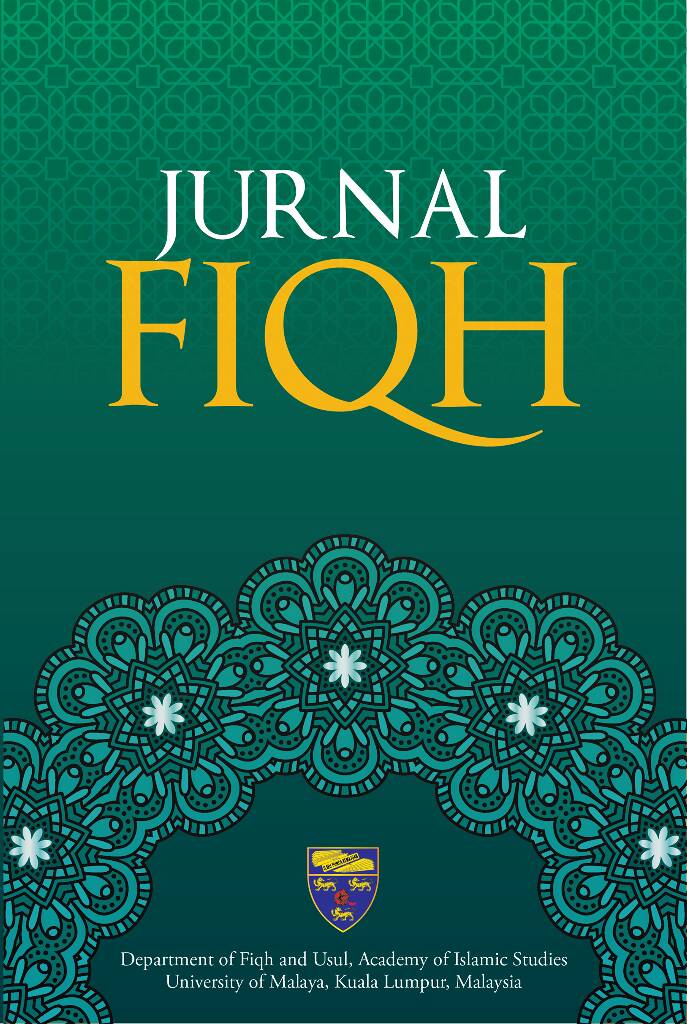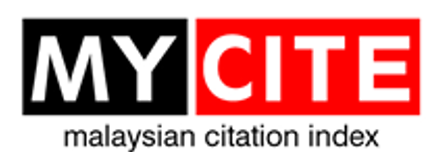دراسة فقهية تحليلية :(NFT) الاستثمار في الرموز غير قابلة للاستبدال
Non-Fungible Tokens (NFT) Investment: A Juristic and Analytical Study
DOI:
https://doi.org/10.22452/fiqh.vol21no1.2Keywords:
Investment, Non-Fungible Tokens (NFT), Islamic JurisprudenceAbstract
Non-fungible tokens (NFT) are considered unique digital assets recorded on the blockchain whose ownership and authenticity cannot be duplicated, exchanged, or divided but can be transferred by the owner, allowing the selling and trading of NFT through the blockchain. This study addresses the issues relating to the extent of NFT compliance with Islamic law. It sheds light on the concept of symbols that are not replaceable and presents the opinions of contemporary jurists in dealings with NFT based on a juristic adaptation of these transactions.The study is qualitatively based and using an inductive approach to collect library information and analytical approach to clarify the issue and present the opinions of the jurists. The study found that investing in non-fungible tokens is legally permissible, but the principles of Shariah must be adhered to when dealing with them because they are among the things that were not prevented except by legal evidence. NFTs should be items of legal value that benefit people, and are free from illegal activities such as usury, fraud, and gambling. The study recommends an urgent need for Shariah scholars and technology experts to create an NFT platform that is compatible with Islamic Shariah, and allowing Muslims to participate in it.
Downloads
References
Abdullah Iter. “Mafhum al-Huriyyah fi al-Fiqh al-Hanafi: al- Huriyah fi Afaqi al-Masalih wa al-Huquq,” Journal of Islamic Ethics (2021), 120-170.
Ahmad Abu Shamalah, Ma Hiyyah ar-Rumuz Ghair al-Qabilah lil Istibdal, available at:< https://www.ibelieveinsci.com<> /
https://ethereum.org/en/nft> /, accessed on 19 April 2022.
Aḥmad bin Al-Jabir al-Hājiriy. al-Qawāʻid wa al-Dawābith al-Fiqhiyyah fi al-Damān al-Māli. Al-Madinah Al- Munawarah: Dar Kunuz al-Ishbaliyyah, 2008.
Aḥmad Mukhtār ʻUmar. Mujam al-Lughah al-Arabiyyah al- Muasirah. Riyāḍ: Dār ‘Alam al-Kutub, 2008.
Alaa al-Hassian al-Hamaamiy. Taknulujiyyah Amniyyah al-Malumat wa Anzimatu al-Himaiyyah. Oman: Dar wail, lil an-Nashr wa at-Tawzi, 1st ed., 2007.
Alāʻu ddin, Abubakr bin Masūd al-Kāsāni. Badāiʻ Sanāiʻ fi Tartīb al-Sharāiʻ, vol. 5. Bayrūt: Dar al-Kutub al-ʻIlmiyyah, 1986.
Al-Bukhari, Muhammad bin Ismail, Sahih al-Bukhari. Bayrūt: Dar ibn Kathir, 2018.
Al-Haihatu al-Amah lil Shuhun al_Islamiyyah wa al-Awqaf, Hukm Tadawul amalah al-Bitcoin wa ghairuha min al-Umlaat ar-Raqmiyah, 60
ʻAliy Haidir Khawājah Amin Afandi. Durar al-Ḥukām fi Sharhi Majallah al-Aḥkām, vol. 1. Lebanon: Dar al-Jail, 1991.
Al-Zarkushi Badr al-Din Muhammad bin Abdullah bin bihādir As-Shafii. al-Mansur fi al-Qawa‘id al-Fiqhiyyah, vol. 3. al-
Kuwait: Wizarah al-Awqaf al-Qwaitiyyah, 1985.
Amanie Advisors, Ethereum Foundation, “Shariah White Paper on Ether”, 29 April 2019, P. 19.
As-Sayyed Muhammad al-Musa, Tarif al-Mal inda Ulamahu As-Shariah, available at: http://shiastudies.com/ar/15132/,
accessed: 26/08/2023.
Assimalhakeem, “Trading in NFT (Buying or Selling)” < https://www.youtube.com/watch?v=iSRCfeeM5aY > 7 February
Astro Awani, “NFT dari Sudut Syariah” < https://w w w. f a c e b o o k . c o m / w a t c h / l i v e / ? r e f = w a t c h _
permalink&v=1222668918571380 > 28 July 2022.
Bihaikash Ayah, & Khairu Jamilah, Al-Jawanib al-Ijabiyyah wa as-Salbiyyah li Istiqdām Umlah Mushafarah, Muzakarah
Muqadama li Istiqmal Mutatalibah Nail Masters, (2021), p.60.
BITFURY GROUP, «Proof of Stake vs Proof of Work 22015( »),< https://bitfury.com/content/downloads/pos-vs-pow-
0.2.pdf >.
Dar al-Ifta al-Misriyyah, Ma Sababu Hurmah al-Umlāl ar- Raqamiyyah, available at: https://www.masrawy.com/ islameyat/others-islamic_ppl_news/details/, accessed on: 26/08/2023.
Dibyan bin Muhammad al-Dibyan. al-Umlah al-Maliyyah Isalatun wa Muasirah. Riyāḍ: Maktabah al-Malik al-Fadh
al-Wataniyyah, 2nd ed. 1432. Ethdocs, «What is Ethereum> – » http://ethdocs.org/en/latest/
introduction/what-is-ethereum.html
Faraz Adam, “NFTs: Shariah Compliant?” < https://amanahadvisors.com/nfts-shariah-compliant/> March 4, 2021.
Faraz Adam, “Shariah Decryption of Real, Financial and Digital Assets” < https://amanahadvisors.com/shariah-decryption-
of-real-financial-and-digital-assets/> February 7, 2022.
Haihatu at-Tahrir, Kulu ma Tahtaj li Marifatihi an ar-Rumuz ghair al-Qābilah lil Istibdāl, https://www.annajah.net > / accessed
on 22 September 2022.
Harvard Business Review: Al-Mafahim al-Idariyyah, available at: https://hbrarabic.com/, accessed on: 25/08/2023.
Hibah Hamādah, Maḥmūd Abu Arab. Athar Istikhdām Taknalujiyyah Silsilah Sijilat al-Raqamiyyah ala baihat al-Muamalat al-Muhasabiyyah. Gazah: Dir al-Balah, ed.1, 2021.
Jake Frankenfield, «Gas (Ethereum)», Investopedia, >https//:www.investopedia.com/terms/g/gas > 22 October 2019. Jamal al-Din Muhammad bin Manzur. Lisan al-Arab. Bayrut: Dar Sadir, ed. 3, 1414H.
Joshua A.T. Fairfield, BitProperty, (88 S. CAL. L. REV. 805, 874,2015) P.820
Krause, Solvej Karla Natarjan, Harish Gradstein, Helen Luskin, “Distributed Ledger Technology (DLT) and Blockchain”, (The World Bank, 2017).
Lajnatu Makawwanah min Iddah ʻUlamāi wa Fuqahāi fi al-Khilāfah al-Uthmāniyyah, Majallah al-ʻAdliyyah, Karashtiy: Nur Muhammad), Mādah 128, p. 31.
Luqman Tirmizi, “Hukum Penggunaan Mata Wang Bitcoin” <https://muftiwp.gov.my> 15 November 2018.
Ma Hiyah Bulokshayn, available at:,< https://ar.cryptonews.com>, accessed on 10/09/2023.
Mafhum Buluk Shayin Silsilah al-Kitlah-Blokshain: Blockchain<https://www.arabictrader.com>
Majalah Labur, “NFT Patuh Syariah ke?” < https://www.youtube.com/watch?v=zjnQHzbEZlQ > 10 March 2022.
Manzur Aliy Muhammad bariy, Muqadaha fi Iqtisadiyyah al-Nuqud wa al-Bunuq. al-Qahirah: Makabah Nahdah as- Shuruq, 1st ed. 1990.
Muhammad Amin bin Umar bin AbdulAziz Abidin. Radd al- Muhtār alā al-ddr al-Muhktar, vol. 4. Bayrut: Dar al-Fikr,
Muhammad Ridā Abdul Jabbār al-Aniy, Al-Muʼtamar al-Islāmiy bi Jeddah, Majallah Majmaʻu al-Fiqh al-Islami al-Taabi li Munazzamah al-Muʼtamar al-Islamīy bi Jeddah, vol. 6, P. 352.
Muhammad Salih al-Munjid, Hukm at-Taʻāmul bi ar-Rumūz ghair al-Qābilah lil Istibdāl, available at: < https://islamqa.
infohttps://www.awqaf.gov.ae398106 > , accessed on: 26/08/2023.
Muhammad Taqiyy al-Uthmani, Fiqh al-Buyu ala al-Madhahib al-Arbaʻah. Dimashq: Dar al-Qalam, 3rd ed. 2020.
Muhammad Uthman Bashir. al-Muamalat al-Maliyyah fi al-Fiqh al-Islami. Oman: Dar al-Nafa’is, 6th ed. 2007.
Mustafa Abdus-Salam, Istismar Bitcoin, Halal am Haram, available at: https://www.alaraby.co.uk/economy, accessed on: 26/08/2023.
Qin Wang, Rujia Li, Qi Wang, Shiping Chen, “Non-FungibleToken (NFT): Overview, Evaluation, Opportunities and Challenges”, (Ithaca: Cornell University, 2021) P. 1.
Rajah Al-Mazrui, Ar-Rumuz Ar-Raqamiyyah Ghayr al-Qabilah lil Istibdāl- Suq bi Milyarat al-Dular, Available at: accessed: 19/07/2022.
Rebecca M. Bratspies, “Cryptocurrency and the Myth of the Trustless Transaction”, (25 MICH. TECH. L. REV. 1, 12–13, 2018), P. 13
Robin Conti, John Schmidt, “What is an NFT? Non-Fungible Tokens Explained” < https://www.forbes.com/ > 8 April 2022.
Saadiy Abu Habib. al-Qamus al-Fiqhi Laghatan wa Istilahan. Dimashq: Dar Nur al-Sabah, 2011.
Umar al-Husaini, Umlat al-Rumuz ghair al-Qaabilah lil-Istibdaal (NFT), Tahdid Jadid lil-Umlat ar-Raqamiyyah aw al-Umlah al-Mushafarah, available at: https://ecss.com.eg/18905/,accessed: 25/08/2023.
Umar Muhammad Ḥithāb Shadīfāt, Taqniyyah al-Umlah al- Iftirādiyyah: Bitcoin Namūzajan. Oman: Jāmiʻatu al-ʻUlūm
al-Islāmiyyah al-ʻālamiyyah, 2018.
Usman W. Chohan, “Non-Fungible Tokens: Blockchains, Scarcity, and Value”, Critical Blockchain Research Initiative (CBRI)
Working Papers, (papers.ssrn.com, 2021) P.5. Vitalik Buterin, “A Next-Generation Smart Contract and
Decentralized Application Platform (Ethereum White Paper)” - > https//:github.com/ethereum/wiki/wiki/White- Paper
Wahbah bin Mustafa al-Zuhayli. al-Fiqh al-Islami wa Adillatuh, vol. 4. Dimashq: Dar al-Fikr, 1985.
Wajiha Rehman, Hijab e Zainab, Jaweria Imran, Narmeen Zakaria Bawany, “NFTs: Application and Challenges”, (Karachi:
Jinnah University for Women, 2021).
Wood, G., et al.:” Ethereum: A secure decentralised generalised transaction ledger”. Ethereum project yellow paper 151(2014), 1–32 (2014).
Yugrathath bin Aliy, Sharhu Mufasal li Umlatu bitcoin, available at: https://io.hsoub.com/ecommerce/4821-bitcoin-%,
accessed: 25/08/2023.
Zainu al-Din Muhammad, Faidul al-Qadir Sharhu al-Jamiu al- Saghir, vol. 1. Qahirah: al-Maktabah al-Tijariyyah al-Kubra, 1st ed. 1357H













